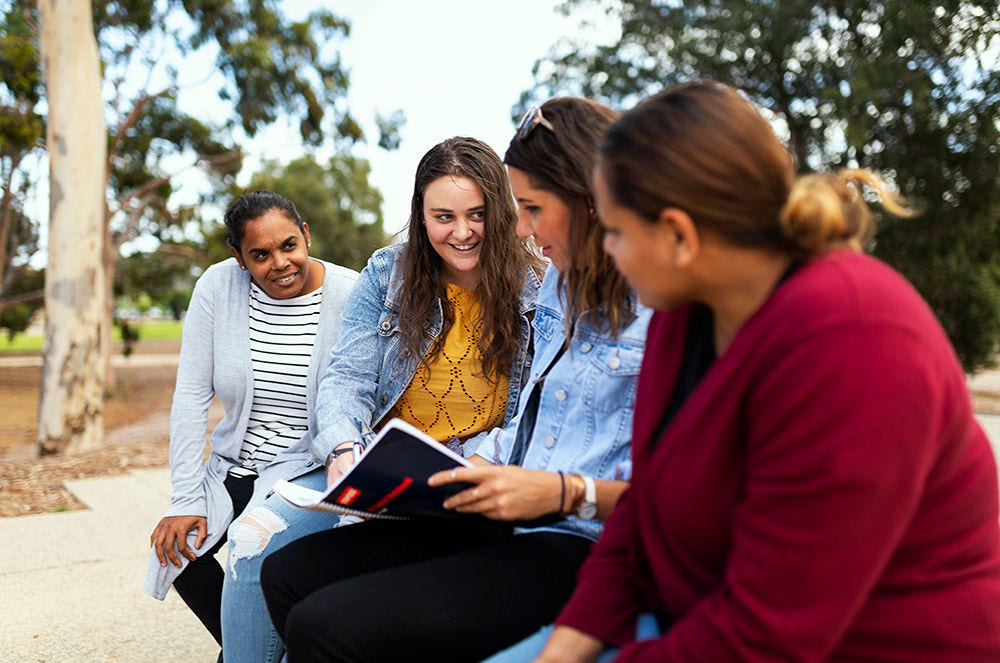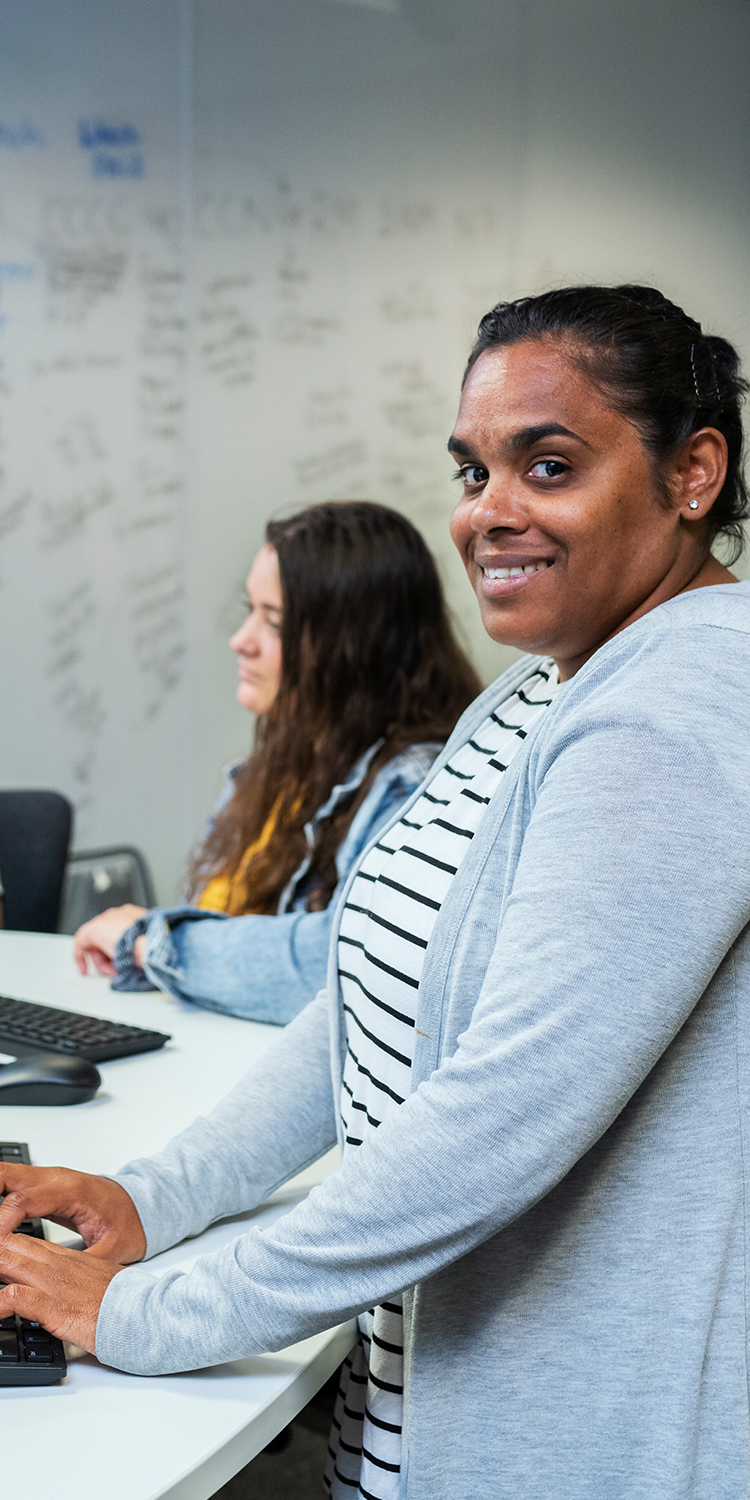Entry requirements
Admission criteria
To be eligible, an applicant must have achieved the following minimum entry requirement and demonstrate they fulfill any prerequisite and essential criteria for admission. In cases where there are more eligible applicants than available places, admission will be competitive with ranks based on the entry criteria.
- Students must be a minimum of 17 years of age to be admitted.
- Students must identify as Aboriginal or Torres Strait Islander.

Courses will be taught in one of five locations: Adelaide City, Ceduna, Mount Gambier, Port Lincoln, and Whyalla.
Please note that entry requirements for this program are provisional and subject to change.
Additional Enrolment Information – FAQs | Adelaide University
Why Aboriginal and Torres Strait Islander Pathway?
The Aboriginal and Torres Strait Islander Pathway program is your first step into a university degree at Adelaide University.
It’s open to all people who identify as Aboriginal or Torres Strait Islander and is delivered over one year of full-time study or part-time equivalent.
Our program will prepare you for university by building your academic and professional skills. Once successfully completed, you’ll have the opportunity to transfer into an Adelaide University degree.
If you have never studied at university before – and thrive in a supportive environment – the Aboriginal and Torres Strait Islander Pathway program will help you meet your study goals.

Overview
Our fee-free Aboriginal and Torres Strait Islander Pathway program will help you develop essential academic knowledge and skills. As an introductory program to university, it aims to prepare you for success in future undergraduate study across the full range of degrees at Adelaide University. You can choose from five study locations including Ceduna, Port Lincoln, Mount Gambier, Whyalla and Adelaide City West campus.
This pathway option is delivered in three blocks, with a series of entry, exit and transition points that cater to different educational backgrounds and chosen destination degrees. You’ll study a culturally responsive curriculum within your local community and engage with culturally specific courses designed by Aboriginal scholars.
You’ll study a mix of core writing, mathematics and elective courses, where you’ll gain confidence as a university student. You’ll also extend your knowledge and skills to meet any prerequisites related to your chosen degree.
We’ll support you to successfully pursue further university study. From enrolment through to program completion, you’ll get help via enrolment sessions, mentoring, small class sizes and access to peer-assisted study sessions.
If you wish to exit your studies after the first two courses, you’ll be awarded a certificate of completion, outlining your learned skills. If you exit the Pathway program after completing four courses, you’ll have guaranteed entry into a wide range of undergraduate degrees (some degrees may have a minimum GPA entry requirement so it’s always best to check before you apply). Completing all eight courses means you will have competitive entry into all undergraduate degrees if you also hold a competitive GPA. Please note quotas may exist for some degrees.
Key features
Prepare for future studies with our fee-free pathway program.
Get a taste of university and learn the skills you need for future study.
Enjoy tailored study support in regional and metropolitan areas.
Choose your own study path based on your preferred future degree.
Use the flexible study options to help you balance study with work, social or family commitments.
Open to all people who identify as Aboriginal or Torres Strait Islander.
What you'll learn
During your Aboriginal and Torres Strait Islander Pathway program you’ll complete up to eight courses, getting you ready for your chosen destination degree.
Some of your core courses will include:
- Introduction to Academic Writing
- Numeracy and Problem Solving
- Aboriginal Knowledges, Narratives and Experiences
- Critical Thinking: Media and Academia.
These courses will develop your academic writing, communication, numeracy, research, and study skills – including how to write academic assignments, cite research and effectively manage time. These skills and experiences will give you the right launchpad to navigate your future at university.
Depending on your chosen destination degree, you will also select up to four electives from a list relevant to your future study discipline. You’ll choose from the following discipline areas:
- Behavioural and Social Science
- Business
- Creative Arts
- Design and Humanities
- Education
- Engineering and IT
- Health
- Law
- Science.
The electives you choose will help set you on the path to your preferred undergraduate degree. You might want to tap into your analytical skills and pursue a data science or mathematics degree. Maybe you want to help our furry friends and complete a degree in animal or veterinary science. Perhaps you’ll reach for the sky and start your journey to becoming a pilot with our aviation degree.

What courses you'll study
Complete 48 units comprising:
- 12 to 24 units for Core courses, and
- 24 to 36 units for Electives
Complete 12 to 24 units for either of the following:
- 12 units for all Block 1 core courses, or
- Both of the following:
- 12 units for all Block 1 core courses, and
- 12 units for all Block 2 core courses
| Course name | Course code | Units | |
|---|---|---|---|
|
Course name
Introduction to Academic Writing
|
Course code
COMM1012
|
Units
6
|
|
|
Course name
Numeracy and Problem Solving
|
Course code
MATH1036
|
Units
6
|
|
| Course name | Course code | Units | |
|---|---|---|---|
|
Course name
Aboriginal Knowledges, Narratives and Experiences
|
Course code
INDG1009
|
Units
6
|
|
|
Course name
Critical Thinking: Media and Academia
|
Course code
COMM1032
|
Units
6
|
|
Notes
Students will be directed to complete a literacy readiness evaluation tool post admission to determine if additional English Language support is required. For those who would benefit from additional support, students must enrol into a fee-free language and literacy development course as part of their study plan.
- Block 1 core courses - Block 1 is specifically designed to support the development of essential academic literacies that will enable students to successfully undertake undergraduate study.
- Block 2 core courses - Block 2 specifically serves to prepare students more specifically for the rigours of a higher education learning environment by providing foundational discipline knowledge and skill development for their intended destination degree.
Complete 24 to 36 units comprising:
- 24 to 36 units from Program electives
| Course name | Course code | Units | |
|---|---|---|---|
|
Course name
Introduction to Human Anatomy
|
Course code
BIOL1008
|
Units
6
|
|
|
Course name
Foundations of Business
|
Course code
BUSI1021
|
Units
6
|
|
|
Course name
Introductory Economics and Personal Finance
|
Course code
ECON1008
|
Units
6
|
|
|
Course name
Foundations of Education Studies
|
Course code
EDUC1029
|
Units
6
|
|
|
Course name
Land Management
|
Course code
ENVI1008
|
Units
6
|
|
|
Course name
ICT Literacies
|
Course code
INFO1027
|
Units
6
|
|
|
Course name
Statistical Literacy
|
Course code
MATH1037
|
Units
6
|
|
|
Course name
Introduction to Human Behaviour (UniSA)
|
Course code
PSYC1022
|
Units
6
|
|
|
Course name
Global Citizenship in the 21st Century (UniSA)
|
Course code
SOCI1015
|
Units
6
|
|
|
Course name
Individual and Society in Contemporary Australia (UniSA)
|
Course code
SOCI1016
|
Units
6
|
|
|
Course name
Introduction to Algebra
|
Course code
MATH1060
|
Units
6
|
|
|
Course name
Introduction to Biosciences
|
Course code
EART1019
|
Units
6
|
|
|
Course name
Science for Tertiary Learning
|
Course code
EART1020
|
Units
6
|
|
|
Course name
Writing for Academic Purposes
|
Course code
COMM1033
|
Units
6
|
|
|
Course name
Digital Literacy: Screen, Web and New Media
|
Course code
INFO1062
|
Units
6
|
|
|
Course name
Introduction to Human Physiology (UniSA)
|
Course code
HLTH1053
|
Units
6
|
|
Notes
Students will be directed to complete a literacy readiness evaluation tool post admission to determine if additional English Language support is required. For those who would benefit from additional support, students must enrol into a fee-free language and literacy development course as part of their study plan.
Your study experience and support
Adelaide University sets you up for success in your studies – and your social life.
Our campuses are equipped with purpose-built facilities where you are supported by the latest technologies and a 24/7 online learning platform with personalised study information and resources.
You’ll have everything you need to live well and thrive during your studies, with health services on campus, gymnasiums, technology zones and modern student lounges. Get involved in campus sport or join our student clubs that will connect you to your passions – and the people who share them. Regional students will also have access to our Mount Gambier and Whyalla campuses, along with our Port Lincoln and Ceduna Study Centres.
Our Study Centres offer free Wi-fi (with your student login), workstations, printing and kitchen facilities. These centres are available to all Adelaide University students. Whether you’re studying online or visiting the area – you’ll have access to our network and online resources.
Our Mount Gambier, Whyalla and Adelaide campuses also have a variety of accommodation options to suit your individual requirements and budget, with options ranging from dedicated student accommodation to private rentals. One of the world’s most liveable cities, Adelaide has lots of leafy parks, gardens and social hubs – and some of the highest living standards globally. No matter where you are in Adelaide, you’re only a short distance from beaches, vineyards, museums, art galleries, restaurants, bars and parklands. Visit the accommodation web page to find out more.
Student services
We’re here to support you on your student journey. Adelaide University offers a range of support services and facilities, including:
- Career advice and mentoring services
- Personal counselling
- LGBTQIA+ support
- First Nations support
- Academic support
- Fees and finance help
- Security services
- Accommodation services
- Common rooms
- Prayer rooms.
You’ll also have unlimited access to our dedicated student support hub. Visit in-person or online, or contact our friendly team by phone. We can assist you with anything study-related including enrolment, identification cards, timetables, fees and more.

Your campus
You'll be studying at one of our renowned campuses, accessing cutting-edge facilities and contemporary study spaces.




